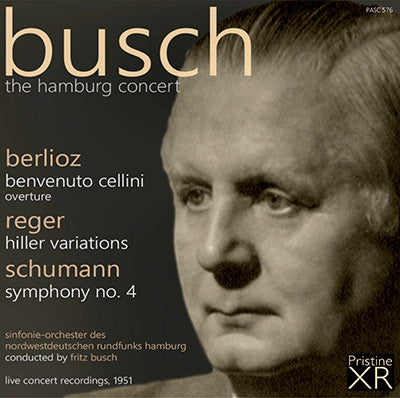
This album is included in the following sets:
This set contains the following albums:
- Producer's Note
- Full Track Listing
- Cover Art
- Contemporary Review
When Fritz Busch eventually returned to Germany in February 1951, it was with very mixed feelings. He and his wife Grete very much had the fear they might have to shake hands with former active National socialists, which had been far from vanished from German social and political life altogether. The opening of the newly-built Broadcasting House in Cologne with a performance of Un ballo in maschera (performed in German and boasting a cast including Walburga Wegner, Martha Mödl, Lorenz Fehenberger and Dietrich Fischer-Dieskau) on 15 February was followed by a short visit to Hamburg, where Busch conducted two concerts in the Musikhalle. Highly praised for his return to Germany, both musicians and the audience warmly welcomed him, the press hailing him as “a unique appearance” in music, “a role model for some ‘congeners’ and a quiet security for those who have become tired of the dishonesty of our time.“ He conducted the Sinfonie-Orchester des Nordwestdeutschen Rundfunks Hamburg in two identical programmes, one of which was broadcast live.
The reviewers of the concert praised Busch’s immediate intimate contact with the orchestra “which sensed his helpful hand (and how few conducting stars know this altruism – this fellowship-wise attitude towards their collaborators and helpers!), his precise technique, his springy rhythms, and played itself under his direction into such enthusiasm that makes the concert a feast, an unforgettable experience for all. Already the first bar of Berlioz’ Overture to Benvenuto Cellini flashed like a sword in the hall – the violinists sounded as if they had Italian instruments in their hands – a tremendous tautness, a colorful liveliness of the sound groups, a plastic force of the tutti completed this work until its close.
In Reger's Hiller Variations Fritz Busch's conducting and interpretation concept became perhaps even clearer, in this work of his choice and love, which covers the landscape divided into many aspects of the theme modification with the dense network of a double fugue, closely dense and almost too artfully woven. The ingenious correctness of the conducting technique, the accents emanating from the shoulders, the vibrato of the hands, the swinging movement of the arm, where music seems to vibrate as if in a shell: did not all this also give Schumann’s Fourth its signum of informal, piano-inspired busyness and its dark heavens that overshadow it like fate? When Fritz Busch conducted these works, placing himself unambitiously and unassumingly at their service, they were magically transformed: the personality of their servant appeared in them, seemed to have connected with them, to have become transparent with them.” (S. Sch. in the Hamburger Freie Presse.)
The original tape of the broadcast, from which apparently no security copy had been made, was in part very much deteriorated as early as 1960 when the tape was revisited and copied, so that four variations from Busch’s performance of Reger’s Hiller Variations are lost. In order to give a full impression of Reger’s intentions the missing c.9.45 minutes have in this production been inserted from a different recording made by another conductor, in a contemporary performance from Paul van Kempen and the Berlin Philharmonic Orchestra, also recorded in 1951.
Jürgen Schaarwächter
Max-Reger-Institut with BuschBrothersArchive, Karlsruhe
FRITZ BUSCH The Hamburg Concert, 1951
1. BERLIOZ Benvenuto Cellini, Op. 23 - Overture (10:32)
REGER Variations and Fugue on a Theme of Hiller, op. 100
2. Theme: Andante grazioso (0:28)
3. Variation 1: Più andante (1:14)
4. Variation 2: Allegretto con grazia (3:59)
5. Variation 3: Vivace (2:30)
6. Variation 4: Poco vivace (1:50)
7. Variation 5: Andante sostenuto (5:05)
8. Variation 6: Tempo di minuetto (3:03)
9. *Variation 7: Presto (2:59)
10. *Variation 8: Andante con moto (2:38)
11. *Variation 9: Allegro con spirito (2:03)
12. *Variation 10: Allegro appassionato (2:02)
13. Variation 11: Andante con moto (6:20)
14. Fugue: Allegro moderato (7:40)
SCHUMANN Symphony No. 4 in d minor, Op. 120
15. 1st mvt. - Ziemlich langsam - Lebhaft (10:37)
16. 2nd mvt. - Romance: Ziemlich langsam (4:21)
17. 3rd mvt. - Scherzo: Lebhaft (4:37)
18. 4th mvt. - Langsam - Lebhaft (7:40)
Sinfonie-Orchester des Nordwestdeutschen Rundfunks Hamburg
conducted by Fritz Busch, Musikhalle, Hamburg, 26 February 1951
*Berliner Philharmoniker, conductor Paul van Kempen, July 1951
XR remastering by Andrew Rose
Cover artwork based on a photograph of Fritz Busch
Special thanks to Dr. Jürgen Schaarwächter
Produced in co-operation with the Max-Reger-Institut/BuschBrothersArchive, Karlsruhe, Germany
Total duration: 79:38
H. J. in Die Welt, 27 February 1951:
„At the desk: Fritz Busch
A splendid evening: an evening of the most intellectual, most confident music making and the highest orchestral culture. To some people Fritz Busch's way of conducting may seem cool and too precise. But what a glowing, music-filled temperament stands behind this noble serenity and tamed passion, which with a superiority beyond compare brings out the utmost in subtlety, as well as in upswing and clarity, from the splendid NWDR Symphony Orchestra. Who exists today who fine-nervedly brightens and builds up spaciously Reger’s musically ascending, yet so incredibly sensitive, lyrical-intimate music, as it became an event here in the Hiller Variations with their mighty double fugue apotheosis? Almost transformed, as if renewed from its roots, seemed Schumann’s D minor symphony: At last without false emotional smoke and nervous frenzy, but all the more real in the passionately poetic impulse, in the penetrating behaviour of its emotions, whose explosive power became even clearer precisely in this formally rigorous reproduction. At the beginning Berlioz’s overture to ‘Benvenuto Cellini’: a brilliant firework of orchestral artistry, which ravishingly revealed the other side of Fritz Busch’s universal and cosmopolitan art: Welcome and applause became ovation.“
